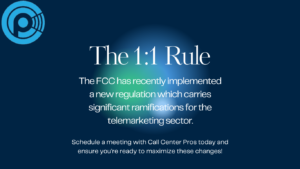
The Federal Communications Commission (FCC) has recently implemented a new regulation known as the “1:1 Consent Rule,” which carries significant ramifications for the telemarketing sector. Telemarketing professionals must understand the intricacies of this rule and the potential effects on their operations.
The Basics of Lead Generation
Imagine you have a company that sells travel packages. To boost sales, the travel company might hire a lead generation firm to compile lists of potential customers. These firms bundle names and sell them. However, when you pay for these leads, you must ensure their legitimacy. If the lead generation company uses deceptive or illegal tactics, the travel company could also be liable for using those leads.
What Determines Consent in Telemarketing?
Anyone connected to telemarketing is (or should be) aware of what prior expressed written consent means. Consumers give companies permission to contact them, usually in exchange for offers or discounts. For instance, if you frequent a travel website and have had good experiences, you might opt-in to receive last-minute deals or discounted trips. It’s a win/win for both the consumer and the travel company.
However, the 1:1 Rule changes this dynamic. If you consent to be contacted by the travel company, you expect only that company to reach out. Previously, lead generators could claim that by consenting, consumers agreed to be contacted by multiple companies, even if they were unaware of it. The 1:1 Rule ensures that consent is given specifically to one company, not multiple.
The Aftermath
The FCC’s new regulation mandates that prior written consent from consumers for auto-dialed telemarketing texts or calls must be specific to the individual company intending to make the contact. This adjustment, known as 1:1 consent, eliminates the “lead generator loophole.” Consent cannot be bundled for multiple sellers; it must be obtained separately for each one. There’s also a ban on using a “hyperlink” list approach. For consent to be valid, it must be clear and conspicuous to a reasonable consumer and comply with the ESign Act for online collections.
These new restrictions are a critical reminder for companies to reassess their compliance with various legal frameworks, including the Telemarketing Sales Rule and state telemarketing laws. Companies are advised to explore effective and compliant methods to secure 1:1 consent for each seller. This may involve A/B testing strategies for consent acquisition and updating contractual agreements to align with these new regulatory requirements, highlighting the importance of adapting to these changes to avoid legal pitfalls and maintain consumer trust.
Contact Call Center Pros
Navigating the complexities of telemarketing regulations can be challenging, but understanding and adhering to the 1:1 Consent Rule is essential for your business compliance. At Call Center Pros, we’re here to support you in adapting to these changes and ensuring your telemarketing operations remain compliant and efficient.
With years of experience in telemarketing services, Call Center Pros can help your business thrive in this evolving landscape. Schedule a consultation with us today to ensure your business stays ahead of the curve and continues to succeed. Don’t be caught off guard by the 1:1 Consent Rule. Get in touch with us now to protect and enhance your telemarketing operations.
